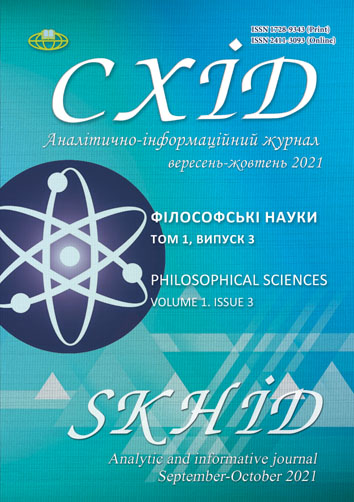MONETARY IDENTIFICATION OF A PERSON AS A PRODUCT OF DISSEMINATION OF VALUES OF WESTERN CIVILIZATION
DOI:
https://doi.org/10.21847/1728-9343.2021.1(3).243547Keywords:
monetary identification, identity, identity crisis, capitalism, money, monetary values, Western civilizationAbstract
The article is devoted to the problem of monetary identity, which needs a detailed study in the context of the transformation processes of the modern world. The relevance of the study is that the identity of modern man is becoming unsteady. In seeking guidance for constructing one’s own “Self”, a person finds himself at a crossroads. They lose the identity they had from birth as members of traditional society and are forced to build it independently. The article reveals the preconditions for the emergence of an identity crisis in the context of the development of capitalism and the formation of the economic man. The purpose of the article is to determine the peculiarities of the formation of monetary identity, which has become essentially a by-product of the spread of Western values. To achieve this goal, a structural-functional analysis of social interactions of the subjects of identification has been conducted, as well as general scientific methods of synthesis and generalization of materials, analysis, comparison, deductive and inductive methods, etc. have been used. The main features of monetary identity are that a person begins to be guided by one’s own selfish principles, and money becomes the main value for such a person, appearing as a universal value that is equivalent to all other material values. In the modern world, monetary identity appears as a global and unstable one, it is formed artificially and serves the modern market for profit within the consumer society. It is concluded that in the modern world, money not only serves to improve the objective circumstances of life, but also becomes a means of achieving public recognition. The problem of monetary identity is especially relevant for Ukraine as a country that focuses on the Western type of management with its achievements, values and at the same time problems, and therefore requires further research.
References
Arnould, Eric J. & Thompson, Craig J. (2005). Consumer Culture Theory (CCT): Twenty Years of Research. Journal of Consumer Research, 31 (4): 868–882, https://doi.org/10.1086/426626
Bauman, Z. (2013). Liquid modernity. John Wiley & Sons https://drive.google.com/file/d/1VEdYdJ-gst-JMPL23OYwGzqDci3XDqSW/view?usp=sharing
Buleev, I. P., Bryukhovetskaya, N.Ye. (2018). Komparativnyy analiz dvizhushchikh sil kapitalisticheskoy i sotsialisticheskoy ekonomik: vozmozhnosti primeneniya v Ukraine. https://www.problecon.com/export_pdf/problems-of-economy-2018-2_0-pages-276_288.pdf (In Russian).
Holt, Douglas B. (2002) Why Do Brands Cause Trouble? A Dialectical Theory of Consumer Culture and Branding. Journal of Consumer Research, 29 (1): 70–90. DOI: https://doi.org/10.1086/339922
Erikson, E. H. (1968). Identity: Youth and crisis (No. 7). WW Norton & company.
Fedotova, V.G. & Kolpakov, V.A. & Fedotova, N.N. (2008). Globalnyy kapitalizm: tri velikie transformatsii. Moscow: Kulturnaya revolyutsiya. (In Russian)
Fromm, E. (1976). To Have or To Be? London: Continuum. URL: https://giuseppecapograssi.files.wordpress.com/2013/08/erich-fromm-to-have-or-to-be-1976.pdf
Giddens, A. (1991). Modernity and self-identity: Self and society in the late modern age. Stanford university press.
Gritsanov, A. A. (2003). Noveyshiy filosofskiy slovar (Ed.3). Minsk: Knizhnyy Dom (In Russian) (In Ukrainian)
Іlin,V.V. (2007). Fіnansova tsivіlіzatsіya. Kyiv: Knyga, 528 pp.
Іlin,V.V. (2011). Fіnansova tsivіlіzatsіya v perspektivakh rozvytku lyudyny і suspіlstva. Fіlosofіya fіnansovoї tsivіlіzatsії: lyudina u svіtі groshey: Conference Papers, Lvіv:16-25. URL: http://kk.nau.edu.ua/article/1369 (In Ukrainian)
Marcuse, H. (1964). One-Dimensional Man: Studies in the Ideology of Advanced Industrial Society, https://libcom.org/files/Marcuse,%20H%20-%20One-Dimensional%20Man,%202nd%20edn.%20(Routledge,%202002).pdf
Robinson, Frank S. (2011). Capitalism & Human Values. Philosophy Now. 83: 28-31. https://philosophynow.org/issues/83/Capitalism_and_Human_Values
Semenov, Yu. I. (2003). Filosofiya istorii. (Obshchaya teoriya, osnovnye problemy, idei i kontseptsii ot drevnosti do nashikh dney). Moscow: Sovremennye tetradi. (In Russian).
Simmel, G. (2004). The Philosophy of Money. London-New-York: Rutledge. http://www.eddiejackson.net/web_documents/Philosophy%20of%20Money.pdf .
Sitkevich, N. V. (2011). Problema identifikatsii cheloveka v informatsionnom obshchestve skvoz prizmu mirovozzrencheskikh izmeneniy. Gramota, 3 (9), Ch. III: 149-151 (In Russian)
Smovzhenko, T. S. et all (2015). Ukrainska lyudina v evropeyskomu svіtі: vimіri іdentichnostі. Kyiv: UBS NBU. (In Ukrainian)
Yadov, V. A. (1994). Sotsialnaya identifikatsiya v krizisnom obshchestve. Sotsiologicheskiy zhurnal. 0(1): 35-52. https://www.jour.fnisc.ru/index.php/socjour/article/view/35/36 (In Russian).
Downloads
Published
How to Cite
Issue
Section
License
Copyright (c) 2021 Tatiana Bezprozvanna

This work is licensed under a Creative Commons Attribution-NonCommercial-NoDerivatives 4.0 International License.
1. Authors bear responsibility for the accuracy of facts, quotations, numbers and names used.
2. Manuscripts are not sent back.
3. The publisher does not always agree with the authors' opinion.
4. The authors reserve the right to authorship of the work and pass the first publication right of this work to the journal under the terms of a Creative Commons Attribution Non-Commercial License, which allows others to freely distribute the published research with the obligatory reference to the authors of the original work and the first publication of the work in this journal.
5. The authors have the right to conclude separate supplement agreements that relate to non-exclusive work distribution in the form in which it has been published by the journal (for example, to upload the work to the online storage of the journal or publish it as part of a monograph), provided that the reference to the first publication of the work in this journal is included.

